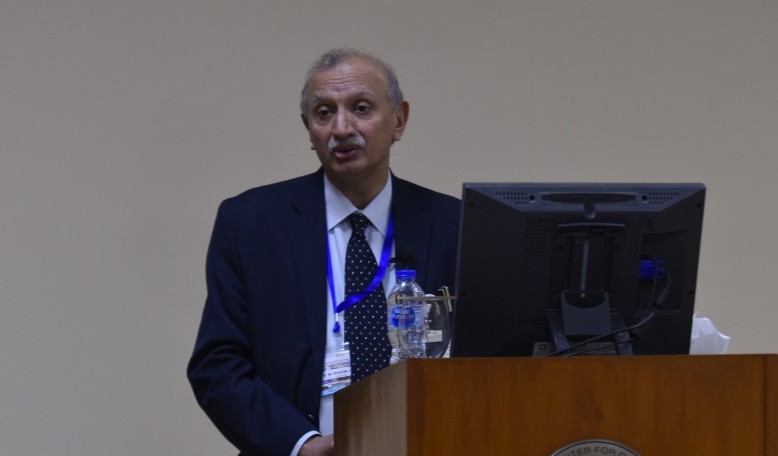Pakistani hepatologist: Liver patients be extra careful in current pandemic


Well-known Pakistani gastroenterologist/hepatologist, Syed Mohammad Wasim Jafri, in an interview with the MSTF discussed how COVID-19 affects the digestive system.
MSTF Media reports:
Syed Mohammad Wasim Jafri, head of the gastroenterology section at the Aga Khan University, regarding the urgency of the current situation said that “for the sake of humanity,” the universities as scientific centers all over the world have to collaborate in order to both develop a vaccine for COVID-19 and find an effective treatment for those who are already infected with this virus.
Not only the universities, but also the governments have to unite and cooperate in order to develop a vaccine and come up with a treatment as soon as possible. “Vaccine is the only way out of any viral disease,” he added.
He said: “Everyone is affected, if not infected, with the Coronavirus.” We have never been sensitized to any other illness this much. Aside from the global death toll, the economic crisis caused by the outbreak of this virus has fostered this sensitization worldwide,” he added.
Jafri said that at first everybody assumed the main mode of COVID-19 transmission is infected droplets when symptomatic people sneeze or cough. Now we know that the incubation period of this virus is almost 14 days, which indicates asymptomatic individuals can also spread the disease.
We have also realized that COVID-19 is detected in feces and urine as well. Therefore, not only the droplets, but also the excreta are infected in COVID-19 patients. “Hence, personal hygiene practices are very important for all of us,” he said
It is also necessary to be aware that once the virus stops spreading through droplets, it continues to remain in feces for almost two more weeks. “So the infected individuals might no more cough or sneeze, but their fecal matter is still infected and it has to be disposed of properly,” he continued.
The Coronavirus can give you mild digestive symptoms such as abdominal pain, nausea, and digestion problems.
“As a hepatologist, I tell you that liver gets affected by numerous viruses like hepatotropic viruses which cause different types of Hepatitis,” he said. They predominantly affect the liver, but the rest of the body is not immune and gets infected as well. Likewise, COVID-19 starts from the lungs, but it goes into your system and thence everywhere.
Digestive system has the highest number of ACE receptors – the receptors that take the Coronavirus. We also have these receptors in our liver, especially in the cholangiocytes of the bile duct; not in the liver cells called hepatocytes. “In fact, the cholangiocytes invite the virus,” Jafri remarked. The lungs, the endothelium of blood vessels, the liver, and the digestive system all have ACE receptors. So, “that’s how the virus spreads throughout the body,” he continued.
When the liver gets damaged, the liver enzymes including alanine transaminase (ALT), aspartate transaminase (AST), alkaline phosphatase (ALP), and gamma-glutamyl transpeptidase (GGT) are released into the blood. So, liver function tests (LFTs) that detect liver damage show elevated liver enzymes and in some cases due to bilirubin the eyes get yellow.
Jafri said that when the liver gets affected by COVID-19, the patients may have symptoms of liver disease like yellow eyes [jaundice].
He emphasized that the patients who already have a background of liver disease, like hepatitis or fatty liver, must be extremely careful in the current pandemic, because their already-damaged liver is highly prone to get exacerbated through COVID-19 infection.
Warning the obese people, he stated that obesity increases the likelihood of various diseases such as diabetes, liver disease, or cardiovascular disease. “Obese people are more susceptible to serious diseases – not asymptomatic, mild, or moderate, but serious,” he added. Therefore, they can be affected badly by COVID-19.
“On the whole, those who are already dealing with health problems have to be extra careful during the current pandemic,” he continued.
Highlighting the importance of eating healthy foods on these days, he said: “As the lockdown may not give us the chance to exercise regularly, in addition to following a healthy diet and avoiding greasy foods, people have to eat in moderation.”
Seasonal foods are always the best to take, in contrast to canned foods. Moreover, based on research, Mediterranean diet is one of the healthiest diets, because it is not only nutrient-rich, but also easy-to-digest. Eat plenty of fruits and vegetables, “but make sure that you wash them thoroughly,” he added.
Syed Mohammad Wasim Jafri is a member of several professional national and international associations of gastroenterology and hepatology. During his illustrious career he has published over 250 articles and book chapters, won a number of prestigious awards, and held top positions. He was an attendant of the 5th round of Science and Technology Exchange Program (STEP) held in Karachi, Pakistan.